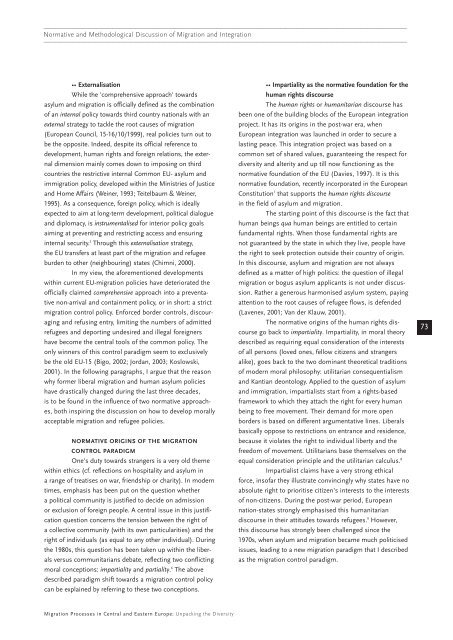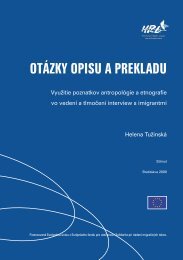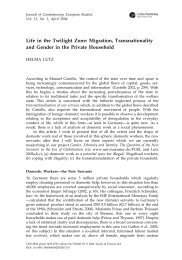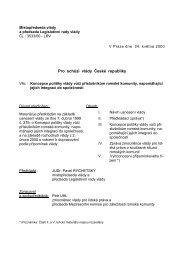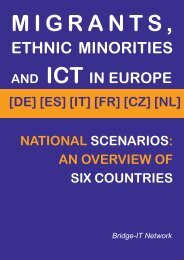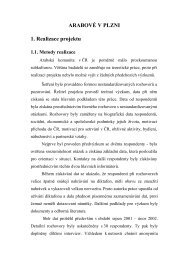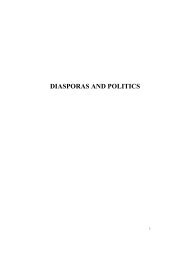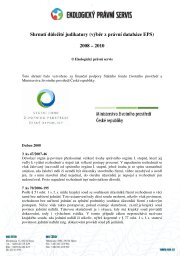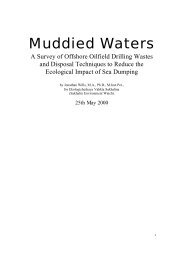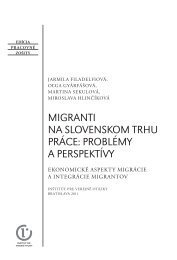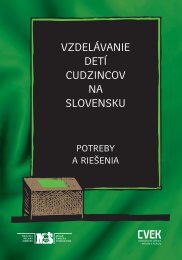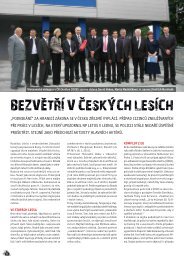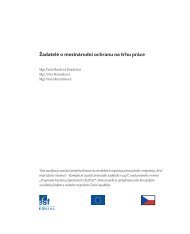Migration Processes in Central and Eastern Europe - Multiple Choices
Migration Processes in Central and Eastern Europe - Multiple Choices
Migration Processes in Central and Eastern Europe - Multiple Choices
You also want an ePaper? Increase the reach of your titles
YUMPU automatically turns print PDFs into web optimized ePapers that Google loves.
———————————————————————————————————————————————————————————————<br />
Normative <strong>and</strong> Methodological Discussion of <strong>Migration</strong> <strong>and</strong> Integration<br />
———————————————————————————————————————————————————————————————<br />
•• Externalisation<br />
While the 'comprehensive approach' towards<br />
asylum <strong>and</strong> migration is officially def<strong>in</strong>ed as the comb<strong>in</strong>ation<br />
of an <strong>in</strong>ternal policy towards third country nationals with an<br />
external strategy to tackle the root causes of migration<br />
(<strong>Europe</strong>an Council, 15-16/10/1999), real policies turn out to<br />
be the opposite. Indeed, despite its official reference to<br />
development, human rights <strong>and</strong> foreign relations, the external<br />
dimension ma<strong>in</strong>ly comes down to impos<strong>in</strong>g on third<br />
countries the restrictive <strong>in</strong>ternal Common EU- asylum <strong>and</strong><br />
immigration policy, developed with<strong>in</strong> the M<strong>in</strong>istries of Justice<br />
<strong>and</strong> Home Affairs (We<strong>in</strong>er, 1993; Teitelbaum & We<strong>in</strong>er,<br />
1995). As a consequence, foreign policy, which is ideally<br />
expected to aim at long-term development, political dialogue<br />
<strong>and</strong> diplomacy, is <strong>in</strong>strumentalised for <strong>in</strong>terior policy goals<br />
aim<strong>in</strong>g at prevent<strong>in</strong>g <strong>and</strong> restrict<strong>in</strong>g access <strong>and</strong> ensur<strong>in</strong>g<br />
<strong>in</strong>ternal security. 5 Through this externalisation strategy,<br />
the EU transfers at least part of the migration <strong>and</strong> refugee<br />
burden to other (neighbour<strong>in</strong>g) states (Chimni, 2000).<br />
In my view, the aforementioned developments<br />
with<strong>in</strong> current EU-migration policies have deteriorated the<br />
officially claimed comprehensive approach <strong>in</strong>to a preventative<br />
non-arrival <strong>and</strong> conta<strong>in</strong>ment policy, or <strong>in</strong> short: a strict<br />
migration control policy. Enforced border controls, discourag<strong>in</strong>g<br />
<strong>and</strong> refus<strong>in</strong>g entry, limit<strong>in</strong>g the numbers of admitted<br />
refugees <strong>and</strong> deport<strong>in</strong>g undesired <strong>and</strong> illegal foreigners<br />
have become the central tools of the common policy. The<br />
only w<strong>in</strong>ners of this control paradigm seem to exclusively<br />
be the old EU-15 (Bigo, 2002; Jordan, 2003; Koslowski,<br />
2001). In the follow<strong>in</strong>g paragraphs, I argue that the reason<br />
why former liberal migration <strong>and</strong> human asylum policies<br />
have drastically changed dur<strong>in</strong>g the last three decades,<br />
is to be found <strong>in</strong> the <strong>in</strong>fluence of two normative approaches,<br />
both <strong>in</strong>spir<strong>in</strong>g the discussion on how to develop morally<br />
acceptable migration <strong>and</strong> refugee policies.<br />
NORMATIVE ORIGINS OF THE MIGRATION<br />
CONTROL PARADIGM<br />
One's duty towards strangers is a very old theme<br />
with<strong>in</strong> ethics (cf. reflections on hospitality <strong>and</strong> asylum <strong>in</strong><br />
a range of treatises on war, friendship or charity). In modern<br />
times, emphasis has been put on the question whether<br />
a political community is justified to decide on admission<br />
or exclusion of foreign people. A central issue <strong>in</strong> this justification<br />
question concerns the tension between the right of<br />
a collective community (with its own particularities) <strong>and</strong> the<br />
right of <strong>in</strong>dividuals (as equal to any other <strong>in</strong>dividual). Dur<strong>in</strong>g<br />
the 1980s, this question has been taken up with<strong>in</strong> the liberals<br />
versus communitarians debate, reflect<strong>in</strong>g two conflict<strong>in</strong>g<br />
moral conceptions: impartiality <strong>and</strong> partiality. 6 The above<br />
described paradigm shift towards a migration control policy<br />
can be expla<strong>in</strong>ed by referr<strong>in</strong>g to these two conceptions.<br />
•• Impartiality as the normative foundation for the<br />
human rights discourse<br />
The human rights or humanitarian discourse has<br />
been one of the build<strong>in</strong>g blocks of the <strong>Europe</strong>an <strong>in</strong>tegration<br />
project. It has its orig<strong>in</strong>s <strong>in</strong> the post-war era, when<br />
<strong>Europe</strong>an <strong>in</strong>tegration was launched <strong>in</strong> order to secure a<br />
last<strong>in</strong>g peace. This <strong>in</strong>tegration project was based on a<br />
common set of shared values, guarantee<strong>in</strong>g the respect for<br />
diversity <strong>and</strong> alterity <strong>and</strong> up till now function<strong>in</strong>g as the<br />
normative foundation of the EU (Davies, 1997). It is this<br />
normative foundation, recently <strong>in</strong>corporated <strong>in</strong> the <strong>Europe</strong>an<br />
Constitution 7 that supports the human rights discourse<br />
<strong>in</strong> the field of asylum <strong>and</strong> migration.<br />
The start<strong>in</strong>g po<strong>in</strong>t of this discourse is the fact that<br />
human be<strong>in</strong>gs qua human be<strong>in</strong>gs are entitled to certa<strong>in</strong><br />
fundamental rights. When those fundamental rights are<br />
not guaranteed by the state <strong>in</strong> which they live, people have<br />
the right to seek protection outside their country of orig<strong>in</strong>.<br />
In this discourse, asylum <strong>and</strong> migration are not always<br />
def<strong>in</strong>ed as a matter of high politics: the question of illegal<br />
migration or bogus asylum applicants is not under discussion.<br />
Rather a generous harmonised asylum system, pay<strong>in</strong>g<br />
attention to the root causes of refugee flows, is defended<br />
(Lavenex, 2001; Van der Klauw, 2001).<br />
The normative orig<strong>in</strong>s of the human rights discourse<br />
go back to impartiality. Impartiality, <strong>in</strong> moral theory<br />
described as requir<strong>in</strong>g equal consideration of the <strong>in</strong>terests<br />
of all persons (loved ones, fellow citizens <strong>and</strong> strangers<br />
alike), goes back to the two dom<strong>in</strong>ant theoretical traditions<br />
of modern moral philosophy: utilitarian consequentialism<br />
<strong>and</strong> Kantian deontology. Applied to the question of asylum<br />
<strong>and</strong> immigration, impartialists start from a rights-based<br />
framework to which they attach the right for every human<br />
be<strong>in</strong>g to free movement. Their dem<strong>and</strong> for more open<br />
borders is based on different argumentative l<strong>in</strong>es. Liberals<br />
basically oppose to restrictions on entrance <strong>and</strong> residence,<br />
because it violates the right to <strong>in</strong>dividual liberty <strong>and</strong> the<br />
freedom of movement. Utilitarians base themselves on the<br />
equal consideration pr<strong>in</strong>ciple <strong>and</strong> the utilitarian calculus. 8<br />
Impartialist claims have a very strong ethical<br />
force, <strong>in</strong>sofar they illustrate conv<strong>in</strong>c<strong>in</strong>gly why states have no<br />
absolute right to prioritise citizen's <strong>in</strong>terests to the <strong>in</strong>terests<br />
of non-citizens. Dur<strong>in</strong>g the post-war period, <strong>Europe</strong>an<br />
nation-states strongly emphasised this humanitarian<br />
discourse <strong>in</strong> their attitudes towards refugees. 9 However,<br />
this discourse has strongly been challenged s<strong>in</strong>ce the<br />
1970s, when asylum <strong>and</strong> migration became much politicised<br />
issues, lead<strong>in</strong>g to a new migration paradigm that I described<br />
as the migration control paradigm.<br />
73<br />
<strong>Migration</strong> <strong>Processes</strong> <strong>in</strong> <strong>Central</strong> <strong>and</strong> <strong>Eastern</strong> <strong>Europe</strong>: Unpack<strong>in</strong>g the Diversity


